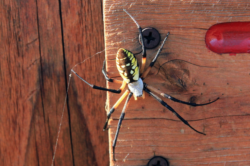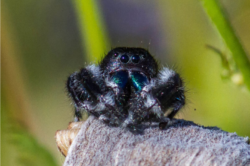
Argiope aurantia
Courtesy US FWS, Willliam Powell, Photographer
 Daring Jumping Spider
Daring Jumping Spider
Phidippus audaxdaring
Courtesy US FWS, Laurie Sheppard, PhotographerI have a new spider roommate that I’ve decided to let stay. This is a bit of a development for me, though, since I’ve never been too keen on spiders, primarily because they’re spiders. They’re those strange land-lobsters that fall from the shower curtains, or appear behind a shelf; those horrid hairy hands that hole up in the bathroom sink to greet you in the groggy morning. “Hi there! I’m a monster!” they yell with delight. “Gahh! You sure are!” I yell back without it.
When I was growing up, I dealt with spiders according to the ‘all are bad’ fallacy. I was a spider killer I’m ashamed to say. I’d grab a wad of toilet paper, or a shoe, and send their bodies to the sewer or dump. As I grew older and learned more about them, however, I switched camps. I learned that they are just wee wolves who wait. They are not malicious or evil, even if some still take a deep breath to see. I then graduated to spider rehabilitator, and it’s where I am still rooted. I have a specific mason jar and slip of cardboard that I’ll catch the spider in, and then send them to the Oregon grapes beside my house. I find rehabilitation easier to cope with than believing that they are still all bad. I never liked killing. Once released, I know that they are actually happier back in their native habitat where they have an abundance of food and opportunity for spider hunting and other activities which behoove them. Maybe they’ll even get to eat or be eaten by an old flame.
But back to my new roommate. Our story begins a few weeks ago: I was brushing my teeth for the evening when I spotted them near the floor in the corner where my bathroom sink meets the wall. They were suspended in a wee web just living their life. About a quarter the size of a raisin, this little one was no threat I figured: they weren’t large enough to be seen as a scare, and, upon brief inspection, weren’t venomous. I decided to pass on an immediate capture and do it the next day or something. In their corner they stayed.
The next evening as I was again brushing my teeth, I was reminded that I would catch them as I saw them again. But today, this itsy spider was not alone: they had caught a hornet in their web and was gleefully doing with it that which spiders do. It surprised me though, that this small hunter in their own right was able to catch and turn a hornet at least ten times its size into leftovers. “Huh,” I thought, “Perhaps I’ll let you stay.” I like hornets less than spiders, and the enemy of my enemy is my friend.
Since then, the bitsy spider in my bathroom has caught even more, and is really doing me a favor. They have snared another hornet, several flies, mosquitos, and other unidentified organisms which I only recognize as tiny Tutankhamuns. My spider roommate has helped me straddle my rehabilitation camp with a new one: teamwork.
Now, while I still do catch other spiders and critters which find their way into my house, I’m allowing the roommate to stay, at least for now. I know there will be a day when my fiancé finally notices them and asks for them to go, but that day is not yet. Until then, I’ll continue to marvel at how my roommate, this eight-legged ecology major, takes on challenges that to us would seem plain mad. If you saw a hornet the size of a Kodiak brown bear, would you even contemplate catching it let alone eating it? That takes some gumption to not back down. I can admire that. So for now, we’ll keep working together, at least until hornet season is over. Then it’ll likely be to the Oregon grapes with you to find that old flame.
I’m Patrick Kelly, and I’m Wild About Utah.
Credits:
Images: Courtesy US FWS, images.fws.gov
Audio: Courtesy & ©
Text: Patrick Kelly, Director of Education, Stokes Nature Center, https://www.logannature.org
Included Links: Patrick Kelly & Lyle Bingham, Webmaster, WildAboutUtah.org
Additional Reading
Wild About Utah, Posts by Patrick Kelly
Stokes Nature Center in Logan Canyon, https://www.logannature.org/
Spiders North America (Spider Identification), InsectIdentification.org, https://www.insectidentification.org/spiders.php
